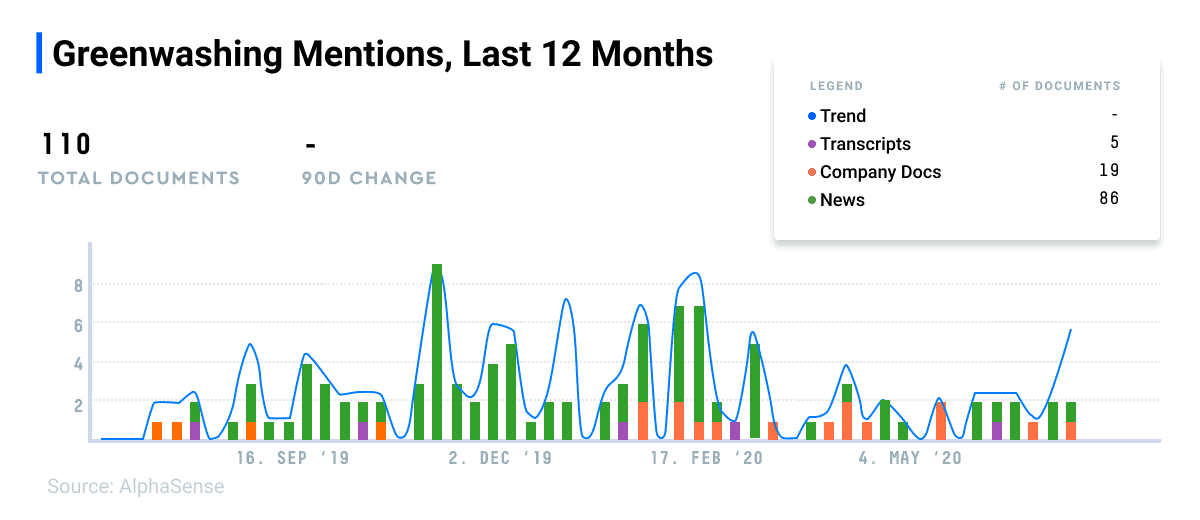Interested in learning more about ESG? Download AlphaSense’s latest sustainable success report “Understanding ESG: Why It Matters and How to Prepare for the Future“.
“Greenwashing” can generally be described as ‘the practice of only paying lip service to environmental, social and governance (ESG) factors with token gestures.’ In practice, greenwashing occurs when an organization presents misleading or inconsistent information that makes it appear more environmentally responsible than it is.
Public companies can attract scrutiny concerning ESG/Sustainability positioning and communications integrity at the corporate disclosure level and the product level. For instance, in the financial investment sector, greenwashing has become an issue and is being called-out across financial companies with sustainable investment products that may be misleading to actual ESG portfolio investments.
Complaints about greenwashing in companies’ voluntary ESG reporting have also reached the Securities and Exchange Commission, with some urging SEC action to take a stronger regulatory stance on ESG disclosure requirements.
Related Reading: 5 Steps to Building an Effective ESG Strategy
Maintaining Perspective
The importance of a range of motivations and ROI advantages behind accelerating company ESG policy, performance, positioning development and sustainability reporting cannot go unignored, and may be even more germane in the process of companies’ COVID-19 recovery efforts. There can be a broad range of opportunities and risks associated with ESG communications, just like with any other investor relations, public relations, and/or marketing reporting and communications positioning.
Results of a new trends study by the Governance & Accountability Institute, confirms that while a majority (86 percent) of large publicly-traded companies in the S&P 500® continue to set the pace for corporate sustainability reporting, 60 percent of the companies included in the Russell 1000® also published sustainability reports in the year 2018.
Adjusting for companies on both indexes, thirty-four (34%) of smaller companies in the Russell 1000® are now publishing sustainability reports. Breakdown by sector shows the number of smaller companies in Utilities and Materials sectors, followed by Consumer Staples, Energy, Consumer Discretionary Industrials, Real Estate, IT, Financials, Communication, and Health Care.
“Due to numerous pressure points from investors and other important stakeholders, we anticipate that this group of smaller companies is reaching a tipping point in terms of beginning their reporting on sustainability matters. Meanwhile, the larger companies are devoting substantial resources to enhance their sustainability journeys and to robustly report on their progress. We expect to see this trend continue to move through the publicly-traded company universe, as well as for privately-owned companies.”
Hank Boerner, Chairman and Co-Founder of The Governance & Accountability Institute
Small and mid-cap companies that are trying to catch up in ESG communications and strategic positioning can learn a lot from larger companies that have blazed the reporting and positioning trail and\ the mistakes they have made. One significant mistake to avoid is the temptation to let exuberant communications teams publish anything that they think will resonate with ESG-interested stakeholders, without strategic coordination, prioritization and materiality assessment.
AlphaSense search: term – greenwashing, parameters – 12 months, U.S. Companies, proxy filings, events transcripts, press releases, RSS article feeds. 5-29-20
The word “greenwashing” has been coming up in various avoidance-related context with increasing frequency. Most of the increase appears to have been in company press release communications. Without COVID-19 crisis communications distraction, one could postulate that the increasing occurrence in press release communications might have been even greater.
Narrowing the search query to the new AlphaSense ESG Reports source only, we found only two companies in the last 24 months, Comerica Inc. and Waste Management, specifically indicate a sort of commitment to avoid “greenwashing” themselves or from their supply chain companies. Time will tell if other companies begin to follow their lead. Deloitte published results of a study in which it suggests ESG risks increasingly demand the attention of chief financial officers. Their research found that 80 percent of ESG disclosures are immaterial, having no correlation to positive performance. Stated another way, effectively only 20 percent of ESG information is likely useful to investors.
A lot of time, money, and effort can be spent creating the 80 percent that can inadvertently result in greenwashing. Keeping teams focused on essential ESG disclosure development can save time, money, and costly negative public perception, and even stem shorting-selling by investors looking to exploit ESG information gaps.
Final Word
ESG/Sustainability reporting is becoming a strategic and competitive necessity at varying but real increased pace across most sectors. It is important to maintain perspective and internal coordination when developing any company’s ESG journey and communications strategy. In the process of catching-up, small and mid-cap companies would be well served to avoid greenwashing.
Pamela Styles is principal of Next Level Investor Relations LLC, a strategic consultancy with dual Investor Relations and ESG / Sustainability specialties.





